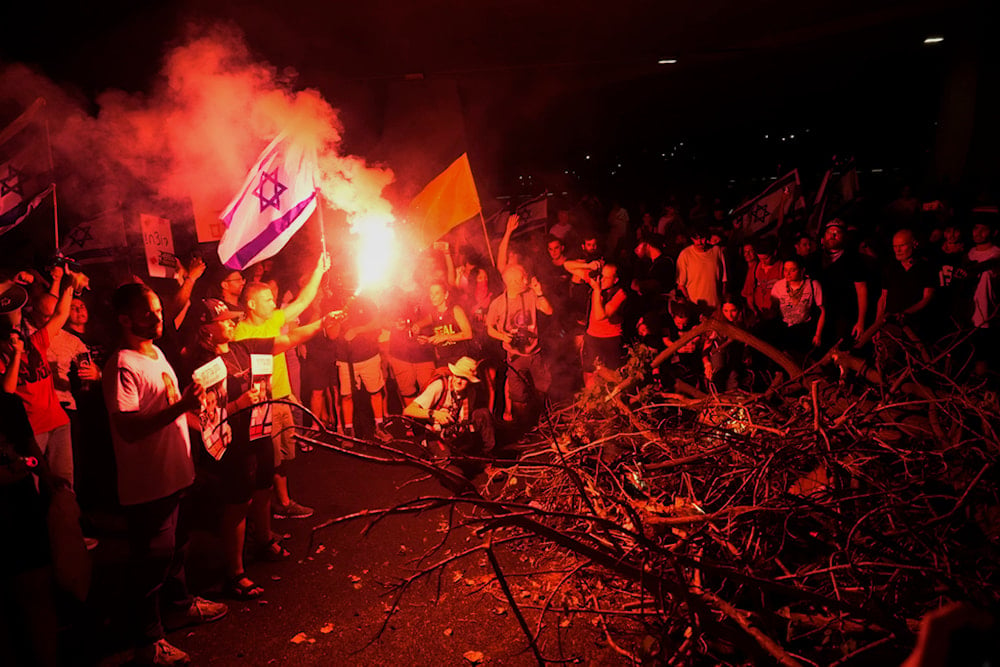Mass protests erupt in Tel Aviv over death of six captives in Gaza
Israeli settlers take to the streets in Tel Aviv to protest against the government for the death of six captives in Gaza.
-

People block a road as they protest calling for a deal for immediate release of captives held in the Gaza Strip, in Tel Aviv, occupied Palestine, Sunday, September 1, 2024. (AP)
Following the announcement of the death of six Israeli captives, whose bodies were recovered by the Israeli occupation forces after being killed by Israeli gunfire during a rescue attempt, widespread calls for a general strike have emerged for Monday. The strike is expected to affect land, sea, and air transportation, as well as public institutions, schools, and other sectors.
However, outraged by Prime Minister Benjamin Netanyahu's handling of the situation, thousands of Israelis did not wait for the planned strike. Starting at 6 pm, protesters began gathering in the streets of Tel Aviv and occupied al-Quds. Observers estimate that approximately 280,000 people are currently demonstrating in Tel Aviv alone, despite repeated attempts by Israeli police to disperse the crowds, which have only grown larger as they reassemble.
The protesters are demanding that the Israeli government abandon its position on the Philadelphi Corridor and the Netzarim Corridor, and return to negotiations that might secure the return of their loved ones alive from Gaza. They argue that the ongoing military operation has resulted in the deaths of many of the captives.
According to Israeli media, the six captives were found dead either Saturday or Friday.
Two families of the deceased captives refused Israeli Prime Minister Benjamin Netanyahu's request to speak with them. Israeli media reported comments from Mossad Chief David Barnea, who remarked that the controversy surrounding the return of Gaza families to northern Gaza was more complex than the issue of the Philadelphi Corridor.
"My personal position is that it would be better to withdraw from Philadelphi and Netzarim to recover the captives; there is no operational need for these two routes," he stressed.
The head of the Israeli Labor Union issued a joint statement with the families of the captives, announcing that Ben Gurion Airport would cease operations starting at 8:00 am on Monday. The statement attributed the lack of progress on the prisoner exchange deal to political considerations and called for a general strike beginning Monday.
Israeli opposition leader Yair Lapid called on labor unions, employers, and local authorities within the Israeli occupation to disrupt the economy. He also petitioned the Knesset speaker to hold an emergency general meeting to discuss reaching an agreement regarding Gaza.
Lapid criticized Netanyahu and his cabinet, saying, "Netanyahu and the death council decided not to save the six hostages who were alive in Gaza. While there are still hostages alive in the Strip, it is still possible to reach an agreement, but Netanyahu is reluctant for political reasons." He added, "Israel is collapsing, and it is impossible to continue like this."
Government divisions
In the wake of Sunday's events and the growing unrest in the streets, Israeli Security Minister Yoav Gallant stated, "If we want the captives alive, we don't have time," calling for the cancellation of the cabinet's decision regarding the Philadelphi Corridor.
Gallant's remarks sparked significant opposition within the Israeli government. Finance Minister Bezalel Smotrich, among others in the cabinet, criticized Gallant during today's session. Smotrich responded to Gallant by saying, "If we bow to Hamas' demands as the defense minister suggests, we will lose the war," leading to calls from coalition members for Netanyahu to dismiss Gallant.
In a sharp rebuke, Prime Minister Netanyahu's office accused Gallant of having "lost his mind" and attempting to incite protests against the government in the streets.
Those close to Netanyahu are furious over Gallant's demand to cancel the cabinet's decision regarding the Philadelphi Corridor, which led to further obstacles in the ceasefire negotiations as it comes against one of the main conditions laid out by the Palestinian Resistance in Gaza; a full Israeli withdrawal from the Strip.
The prime minister's office accused Gallant of "trying to ignite protests in the streets against the government," referring to the hundreds of thousands of Israelis who took to the streets on Sunday evening, mainly in Tel Aviv, demanding a prisoner exchange and ceasefire agreement with the Palestinian Resistance.
Contributing to the eruption of the demonstrations was the Israeli military announcement that the bodies of six captives were recovered in Gaza's Rafah today.
Israeli media reported that throughout the day, Netanyahu's office issued briefings against the security minister. However, according to Israeli reports, Gallant will not be dismissed from his position.

 4 Min Read
4 Min Read








